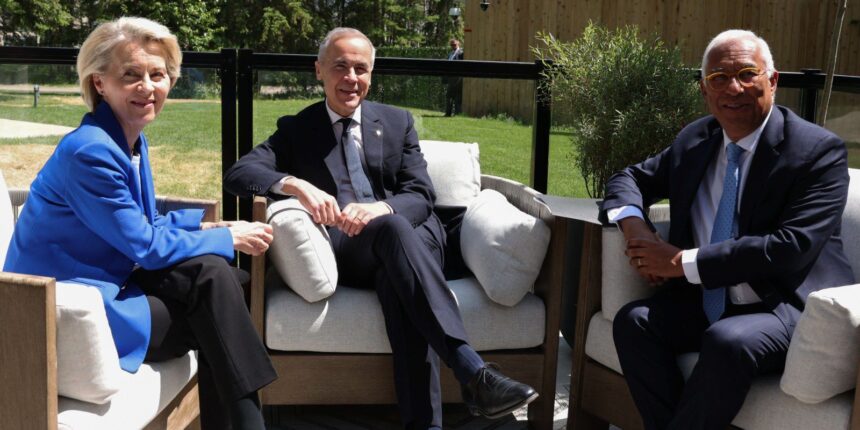In a landmark development for transatlantic security cooperation, Canada and the European Union have signed a comprehensive defence agreement that significantly deepens military collaboration between the longtime allies. The pact, formalized yesterday in Brussels, represents the most substantial enhancement of Canada-EU defence relations in over a decade and comes amid growing global security challenges.
Prime Minister Justin Trudeau, flanked by Defence Minister Anita Anand and Foreign Affairs Minister Mélanie Joly, characterized the agreement as “a natural evolution of Canada’s unwavering commitment to European security and our shared democratic values.”
“This isn’t merely a symbolic gesture,” Trudeau emphasized during the signing ceremony. “This pact delivers concrete mechanisms for joint military training, intelligence sharing, and coordinated responses to emerging threats in an increasingly complex security landscape.”
The agreement, officially titled the Canada-European Union Comprehensive Security and Defence Cooperation Framework, establishes several key initiatives that will reshape military collaboration between Ottawa and Brussels for years to come.
Central to the pact is a new Canada-EU Rapid Response Mechanism that enables faster deployment of personnel and resources during crises. According to Defence Ministry documents, this includes establishing joint command structures that can be activated within 72 hours of a security incident.
European Commission President Ursula von der Leyen praised the agreement as “a testament to the indispensable nature of the Canada-EU partnership in maintaining the rules-based international order.”
The pact also addresses emerging security domains, with substantial provisions for cybersecurity cooperation, space defence, and countering disinformation campaigns. These elements reflect growing concerns about hybrid warfare tactics that blend conventional military threats with information operations and digital disruption.
“The threat landscape has evolved dramatically since our last major defence agreement,” explained Dr. Thomas Juneau, associate professor at the University of Ottawa’s Graduate School of Public and International Affairs. “This pact acknowledges that security challenges no longer fit neatly into traditional military categories.”
Economic dimensions feature prominently in the agreement as well. Defence industry cooperation will be enhanced through reduced barriers to procurement, joint research and development initiatives, and simplified regulatory frameworks for defence contractors operating across Canadian and European markets.
“The defence industrial cooperation aspects of this agreement represent a significant opportunity for Canadian manufacturers,” noted Christyn Cianfarani, President of the Canadian Association of Defence and Security Industries. “We’re looking at potential export growth of $1.2 billion annually within five years.”
Critics, however, have questioned whether Canada’s chronically underfunded military can fulfill its expanded commitments. Conservative defence critic James Bezan described the pact as “ambitious rhetoric without the necessary financial backing,” pointing to Canada’s persistent failure to meet NATO’s defence spending target of 2% of GDP.
The agreement arrives at a critical juncture in global affairs, with ongoing conflicts in Ukraine and escalating tensions in the Indo-Pacific region. It also serves as a counterbalance to growing skepticism about American security guarantees following years of unpredictable foreign policy positions from Washington.
While the pact represents a significant diplomatic achievement, its long-term impact will depend on implementation and sustained political commitment on both sides of the Atlantic. The first major test will come this autumn when joint military exercises are scheduled in Latvia, where Canada leads NATO’s multinational battlegroup.
As global power dynamics continue to shift and new security challenges emerge, the question remains: will this enhanced Canada-EU partnership prove resilient enough to withstand the geopolitical turbulence of the coming decade?










